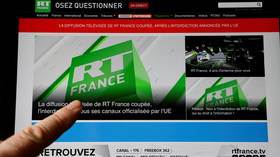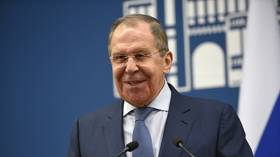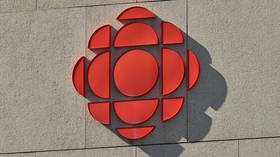RT France challenges EU Council over broadcast ban

The European Court of Justice is in the process, on Friday evening, of hearing RT France’s appeal against the Council of the European Union after it suspended the channel’s broadcasts.
Both sides are making their case before 15 judges in Luxembourg.
Brussels is being represented by the legal department of the Council and several member countries have expressed their desire to participate in the process, including France, Belgium, Estonia, Latvia, Lithuania, and Poland.
RT France, meanwhile, has availed of the services of French lawyer Emmanuel Piwnica, the former president of the Bar Association at the Council of State and the Court of the Cessation of France, who has over 40 years of experience representing clients before France's top courts, as well as international and foreign equivalents.
The hearing began with an opening statement by Piwnica. However, shortly after he started making his opening statements, the channel’s president, Ksenia Fedorova, reported that Twitter had unexpectedly decided to ban RT France’s Communication service channel on the entire territory of the European Union.
Fedorova blasted Twitter’s decision as a “step closer to total censorship,” noting that the account of the communication service of RT France was “solely dedicated to information on our channel.”
“Apparently they didn’t want to give supporters of our channel the opportunity to spread information about the hearing,” she noted on her Telegram channel.
The session continued as Piwnica made the case that RT France was a French company and a media outlet authorized by the French audiovisual regulator ARCOM, which has never sanctioned the channel.
He insisted that the censorship imposed by the EU was illegal under the bloc’s own laws, which do not allow the Council to ban any media, and that the sanctions constituted an attack on pluralism and freedom of expression.
“RT France must be silent, says the Council of the EU, because RT France would be a propaganda tool for the Russian Federation. RT France would not have the right to speak. False, it is not a propaganda tool. The position of the Council is illegal!” Piwnica argued.
He added that the only thing the Council really wanted was the complete disappearance of RT France because of “war,” but noted that “even the war does not allow the Council of the EU to act, the legislation does not allow it!”
Piwnica insisted that a conflict between two third states did not allow the Council to free itself from the “legal framework which determines its powers” and that no assessment of RT France’s editorial content has been carried out to justify the censorship and prove the claims of ‘propaganda’.
“It is precisely in times of crisis, of war, that fundamental rights are essential for everyone … I ask you to cancel the decision of the European Union to prohibit the broadcasting of RT France within the European Union,” Piwnica concluded.
Representatives of the Council responded by justifying the “exceptional measure” by stating that since RT was funded by a state “whose leader has launched a war against a sovereign state” it was not treated as “ordinary media by a propaganda organ.”
EU Commission representative Daniel Calleja Crespo insisted that the objective of the ban was to “protect the European public order against Russian aggression against Ukraine” and argued that the legal measures taken by the Council were compatible with the bloc's laws.
Later in the hearing, representatives of the participating EU member states took turns proclaiming support for the Council’s decision, with most of them arguing that RT was “propaganda” and “part of a modern war arsenal” that should not be granted the right to freedom of expression over, what they judged as, its support for Russian's military offensive in Ukraine.
At the same time, none of the speakers accusing RT France of propaganda, during the hearing, have presented any specific examples or evidence of the channel’s alleged transgressions.
RT France initially filed its appeal on March 8, requesting the EU reverse its March 1 decision to ban the broadcasting of the channel in all member countries. The network has insisted that the ban is illegal and an example of unfounded censorship by the EU, one which constituted a “serious attack on freedom of speech.”
Meanwhile, the Council has maintained that all RT channels, and RT France in particular, are considered to be Russian propaganda weapons used to justify and legitimize Russia’s war in Ukraine.
The Council has justified its classification of RT France as ‘propaganda’ by pointing to the fact that the channel is entirely funded by the state, has been banned by other countries – such as the United Kingdom – and that it allegedly disseminated propaganda on at least one instance on February 24, 2022.
RT France defended itself by pointing to the fact that its source of funding has been widely known and that it in itself does not justify a ban as there are countless examples of state-funded media projects that have never been subjected to any sanctions, including France24.
The channel also maintains that it is editorially independent and has never been sanctioned by the French regulator CSA/ARCOM, which is supposed to be the only authority with the legal right to sanction a TV channel, in the country.
As for the alleged ‘dissemination of propaganda’ claimed by the EU, RT France’s legal team has provided evidence that the elements of its broadcast, deemed to be ‘propaganda’ by the Council, actually represented all points of view and contained the exact same information which was being covered by other media channels which have not faced any sanctions or accusations of propaganda.
The channel has insisted that all the sources of information distributed by RT France were always clearly indicated and that the act of relaying the point of view of Russia is not in itself illegal and merely represents information provided to the media.
RT France surmises that its mode of funding, and not the content of its broadcast, has been the sole underlying reason for its ban and insists that the Council has no right to assess or qualify the editorial content of any channel, as that function is specifically and exclusively assigned to national regulators who would otherwise be simply denied their role.















